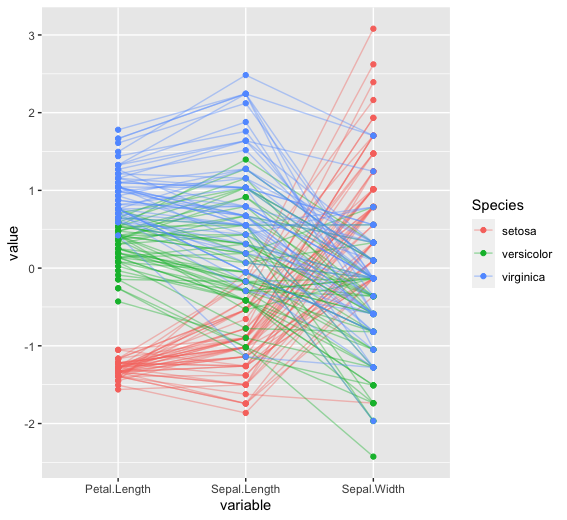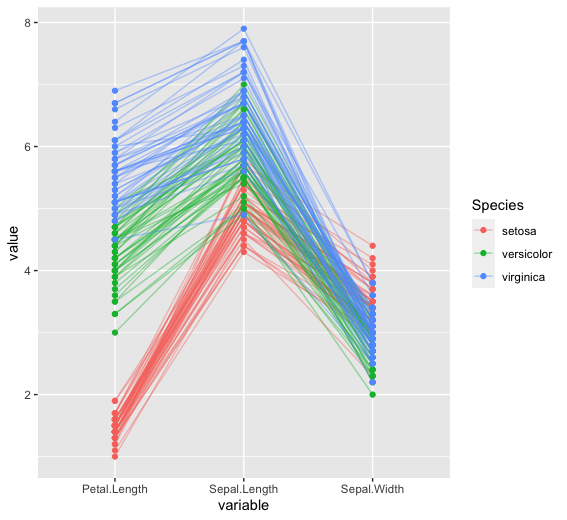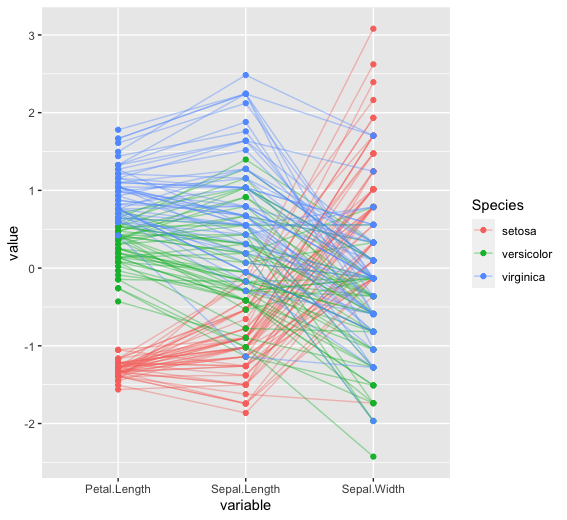R语言 缩放变量平行坐标图
为了分析和可视化高维数据,我们可以使用平行坐标图。绘制一个由n条平行线组成的背景,通常是垂直和均匀间隔的,以显示n维空间中的一组点。n维空间中的一个点由一条顶点位于平行轴上的折线表示;该点的第 i个坐标与顶点在第i个轴上 的位置相对应。
R编程语言中的缩放变量平行坐标图
这种表示方法类似于时间序列的可视化,只是它用于没有自然顺序的数据,因为轴与时间点没有关联。因此,几个轴的布局可能会引起人们的兴趣。
使用的模块
- GGally: 它对ggplot2进行了扩展,增加了几个函数,以降低将几何图形与转换后的数据相结合的复杂性。它可以通过以下命令安装。
install.packages("GGally")
- hrbrthemes: 它是一个额外的’ggplot2’主题的汇编,用于轴和绘图。
install.packages("hrbrthemes")
为了绘制平行坐标图,我们将使用ggparcoord()方法。
语法: ggparcoord( data, columns = 1:ncol(data), groupColumn = NULL, scale = “std”, scaleSummary = “mean”, centerObsID = 1, missing = “exclude”, order = columns, showPoints = FALSE, splineFactor = FALSE, alphaLines = 1, boxplot = FALSE, shadeBox = NULL, mapping = NULL, title = “” )
参数
- data: 数据集
- columns: 变量向量(名称或指数),作为图中的坐标轴
- groupColumn: 按单个变量分组(颜色)。
- scale: 用于缩放变量的方法(详见)。
- scaleSummary: 如果scale==”center”,用于对每个变量进行单变量中心化的汇总统计。
- centerObsID: 如果规模==”centerObs”,案例图的行号,应以其为中心进行单变量统计。
- missing: 用于处理缺失值的方法(见细节)。
- order: 用于对坐标轴进行排序的方法(详见)。
- showPoints: 逻辑运算符,表示是否应该绘制点。
例子1:不使用比例尺
这里我们将看到不使用缩放变量。为此,我们将不使用 缩放 属性。
# Libraries
library(GGally)
library(viridis) # provide the color palette
library(hrbrthemes) # provides themes for axis and plot
# default data in R
data <- iris
# glimpse of the data
head(data)
# plotting the Parallel Coordinates
ggparcoord(data, # data
columns = 1:3, # plotting first 3 columns
alphaLines = .4, # transparency of the color
groupColumn = 5, order = "anyClass",
showPoints = TRUE) +
theme(
plot.title = element_text(size=10)
)
输出
Sepal.Length Sepal.Width Petal.Length Petal.Width Species
1 5.1 3.5 1.4 0.2 setosa
2 4.9 3.0 1.4 0.2 setosa
3 4.7 3.2 1.3 0.2 setosa
4 4.6 3.1 1.5 0.2 setosa
5 5.0 3.6 1.4 0.2 setosa
6 5.4 3.9 1.7 0.4 setosa

例2:使用MinMax缩放
这里我们将使用mixmax缩放变量, scale = “globalminmax “。
# Libraries
library(GGally)
library(viridis) # provide the color palette
library(hrbrthemes) # provides themes for axis and plot
# default data in R
data <- iris
# glimpse of the data
head(data)
# plotting the Parallel Coordinates
ggparcoord(data, # data
columns = 1:3, # plotting first 3 columns
alphaLines = .4, # transparency of the color
groupColumn = 5, order = "anyClass",
scale = "globalminmax",
showPoints = TRUE) +
theme(
plot.title = element_text(size=10)
)
输出
Sepal.Length Sepal.Width Petal.Length Petal.Width Species
1 5.1 3.5 1.4 0.2 setosa
2 4.9 3.0 1.4 0.2 setosa
3 4.7 3.2 1.3 0.2 setosa
4 4.6 3.1 1.5 0.2 setosa
5 5.0 3.6 1.4 0.2 setosa
6 5.4 3.9 1.7 0.4 setosa

例子3:用标准化进行缩放
在这里,我们将使用 scale=”std “的标准化缩放变量。
# Libraries
library(GGally)
library(viridis) # provide the color palette
library(hrbrthemes) # provides themes for axis and plot
# default data in R
data <- iris
# glimpse of the data
head(data)
# plotting the Parallel Coordinates
ggparcoord(data, # data
columns = 1:3, # plotting first 3 columns
alphaLines = .4, # transparency of the color
groupColumn = 5, order = "anyClass",
scale = "std",
showPoints = TRUE) +
theme(
plot.title = element_text(size=10)
)
输出
Sepal.Length Sepal.Width Petal.Length Petal.Width Species
1 5.1 3.5 1.4 0.2 setosa
2 4.9 3.0 1.4 0.2 setosa
3 4.7 3.2 1.3 0.2 setosa
4 4.6 3.1 1.5 0.2 setosa
5 5.0 3.6 1.4 0.2 setosa
6 5.4 3.9 1.7 0.4 setosa

 极客教程
极客教程